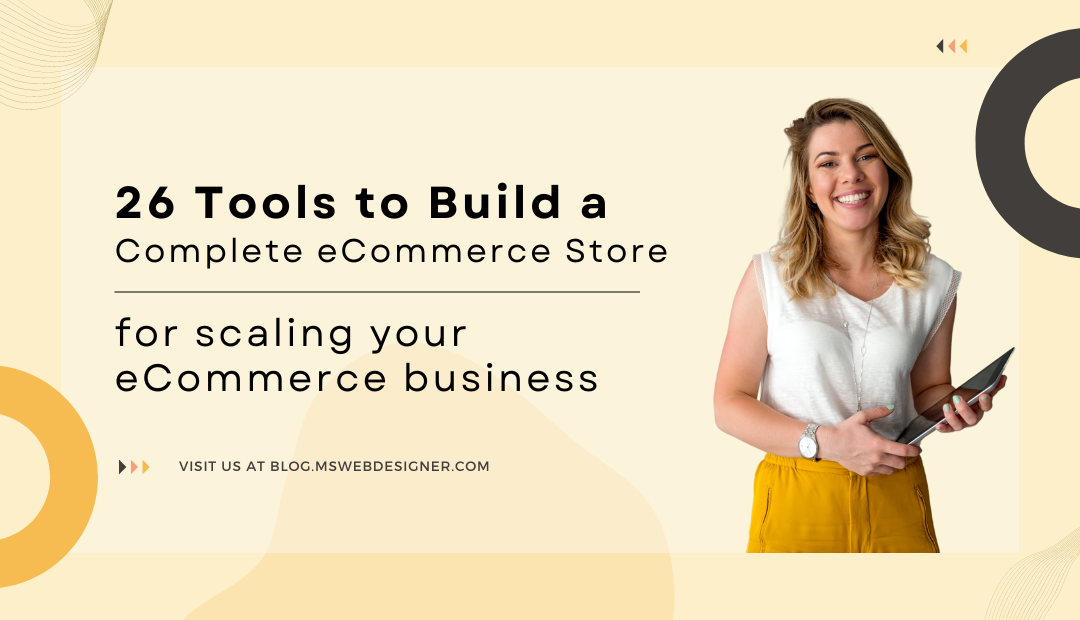In E-commerce, sustainability and growth are impossible unless you take advantage of tools that can help you scale your business.
At first, you might have been able to keep up but, if you want to scale up, you need to get out of your comfort zone and focus instead on optimization and growth.
The problem is there are tons of tools out there. It’s not always easy to know where to start or which to choose. There are just so many choices that the website owner is tempted to put in as many as he/she could possibly fit.
The only downside to this being Apps are load time-dependent and will slow down your website speed considerably if too many have been installed.
With such new Website owners in mind, below mentions 26 of the top Tools/Apps currently in the market that you just must consider:
1. eCommerce Platform Selection:
Firstly choose the platform you wish to sell on. There are a lot of E-commerce platforms out there such as Shopify, Wix, Magento, WooCommerce, BigCommerce, and more. Shopify is the most powerful E-commerce platform trusted by Millions of businesses in 175 countries around the world that have made over $200 billion USD in sales using Shopify.
2. Business Name Generator
The Shopify tool, Business Name Generator, allows you to easily find a business name for your store. You can enter the keywords you want to include in your business name. And then a whole list of domain names populate with your keyword. This is especially good for those who are not good at naming!
3. Slogan Maker
Shopify Tools like the Slogan Maker allow you to create a catchy slogan for your homepage banner, ad copy, or social media graphics.
You can either enter your business name, niche or keyword to find a list of possible slogans you can use. Each keyword you use will provide you with a different selection of slogans so you have a variety of choices to choose from!
4. Burst
Burst specializes in photography for online retailers, you’ll find stock photos for niches like cell phone cases, watches, and make-up brushes, which can be hard to find on traditional stock photo sites. You can browse the Shopify tool Burst within your Shopify admin or on their Burst website. New images are added to their growing collection of stock photography at least twice a week to ensure that the latest E-commerce trends have stock images. These pictures can be applied to your Hero Banners and many other places where pictures are needed.
5. Logo Maker
Shopify tools cater to all your eCommerce requirements and among these requirements is the Logo maker. You can utilize this tool to create your Logo for your store. Make sure your Logo follows Branding guidelines such as Color Scheme, Themes, and Fonts.
6. Image Resizer
When you import your own product images for the first time, you will notice that they’re not all the same shapes. Shopify’s Online Image Resizer tool. You can choose from preset sizes. Its main purpose – all your product photos to look unified throughout your product collections. Keeping the Image Resizer keeps your website looking neat and clean with everything in order. Use this App if images are changed frequently. Check for website speed optimization changes post using this plugin.
7. Shop Phone
Shop Phone App alerts you of any Abandoned Checkout, any VIP presence, and Repeat customers in the process of making a high-volume purchase. This app connects with the customer on a more personal basis. Helping close the checkout.
8. Oberlo ( For Shopify Dropshipper )
Oberlo is essentially a dropshipping tool. Dropshipping is a business model where you, the retailer, sell products from a manufacturer directly to the consumer. The Oberlo app helps you to find products to sell online. You can choose from a database of millions of products that you can easily add to your store with a click of a button.
9. Mailchimp
Mailchimp is an E-mail marketing service provider which can be used to connect with your customers in order to update them on the latest product updates and offers.
10. Google Analytics
With Google Analytics, you can track user sessions, pageviews, conversions, time on page, bounce rates, and more. You also get reports that can help you identify problems in real time.
11. Facebook Ads
Facebook Ads help launch campaigns that target specific users or types of users. Facebook Ads are a great option for E-commerce businesses because the cost is relatively inexpensive compared to other options.
12. Hotjar
Hotjar is an analytics App similar to Google Analytics where you can view user movements and sessions in real-time and heatmaps.
13. Facebook Pixel
The Facebook pixel is a piece of code that you put on your website that allows you to measure the effectiveness of your advertising by understanding the actions people take on your website.
14. Canva
Canva is a graphic design platform, used to create social media graphics, presentations, posters, documents and other visual content. The app includes templates for users to use. Canva is a good tool to use if you don’t know Photoshop.
15. Intercom or Twak.to or Tidio (Live Chat)
Consider using Live Chat Apps for your Customer Support. Tidio even comes with Chatbots to help you out.
16. Landing page Builder – Pagefly / Shogun Shopify app
Pagefly and Shogun are powerful drag-and-drop store builders for Shopify. Now you can launch an entire store — all without code.
Unlike Pagefly, Shogun does not have a free plan.
17. Smile
Smile is a customer loyalty program that drives more sales by connecting with existing customers. You can give points or rewards for purchases, social shares, and customer referrals through Smile.
18. Yotpo
Yotpo is a customer review tool used to integrate with your eCommerce Store. Yotpo is a plug-and-play Shopify app, which means you can add Yotpo to your Shopify store with just one click, and start collecting reviews immediately.
19. Optimizely
Optimizely helps you track your revenue without a Shopify Plus plan. This App works on all versions of Shopify.
20. Buzzsumo
Buzzsumo will recommend relevant content based on the keyword phrases you enter. For example, if you want to see what’s trending on the subject of E-commerce, simply enter that as a search term. It will return all the most popular posts on that subject across the entire web.
21. TaxJar
TaxJar connects to all the places where you sell and helps you navigate your sales tax liability. Taxjar shows you where you should be collecting sales tax based on economic nexus laws and provide jurisdiction-level return-ready reporting.
22. QuickBooks
QuickBooks is accounting software with multi-user logins and extensive analytics, that help you keep track of your business and revenue.
23. ShipStation
ShipStation can import Shopify’s Fraud Risk Assessment to a custom field to help merchants identify at-risk orders. Run automation rules to tag and put orders on hold for further review to avoid shipping out fraudulent orders.
24. Return Prime
It’s a given fact, a lot of your customers will want to return products for various reasons. Return Prime helps you simplify the returns process by letting you automate cash and offer exchanges, automatically generate and print return labels, and create automation rules to personalize the returns experience for your shoppers.
25. Referral Candy
Customers who love your products are much more likely to refer them to a friend. Take advantage of a referral program, or you could be losing some nice sales. Referral Candy is a perfect Shopify app for creating custom referral programs for your online store.
26. Plugin SEO
Plugin SEO keeps a watch on your webshop and makes sure your SEO is intact. Once installed, this app will automatically detect all the SEO aspects of your store—including keywords, speed, blog content, broken links, and other SEO problems—so you won’t need to check pages individually. It is one of the best Shopify apps for search engine optimization (SEO).
As Shopify design experts and eCommerce website developers, all the tools mentioned above are for any eCommerce website to run seamlessly. Though all the tools are also not suitable for your business so choose the tools that suit your business best. We advise you to keep your Website running smoothly with as few Apps as necessary. The above-mentioned apps are for you to tinker with and see if they match your needs. Installing all of them is probably not the best idea!
Remember, tools slow down website loading speeds. Keep your Shopify website speed optimized at all times. If you’re left feeling confused about which tools to go for, feel free to connect with us. We’ll take a look at your site and tell you what’s best!

